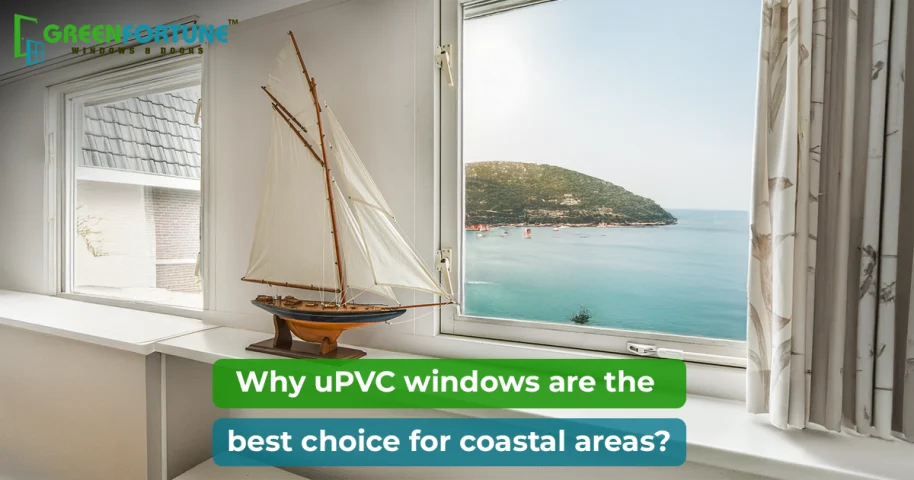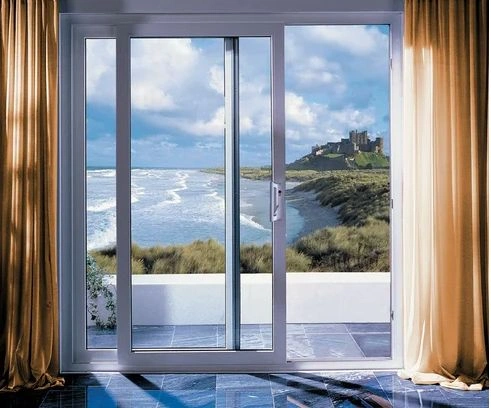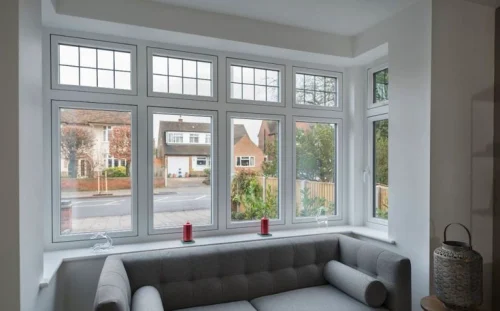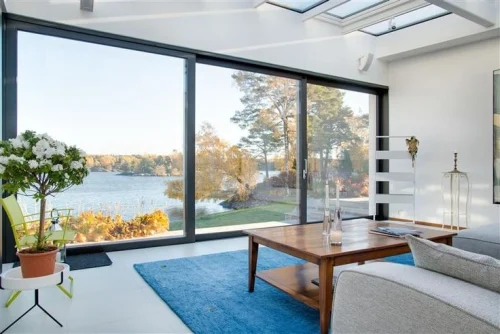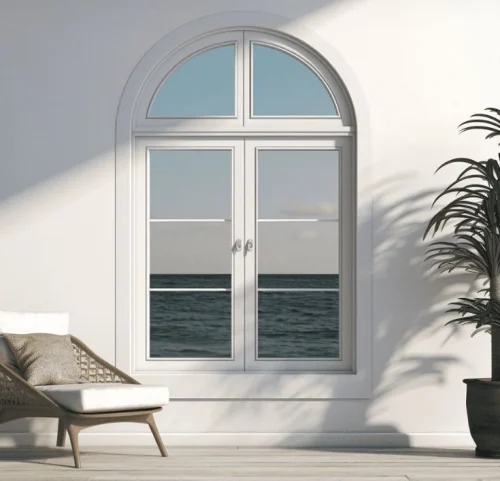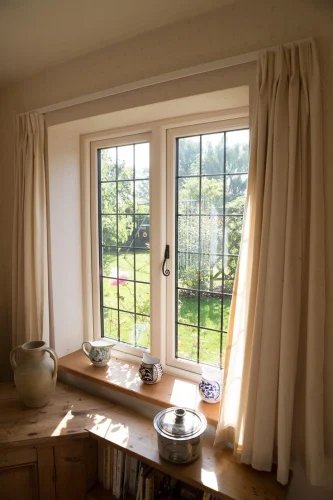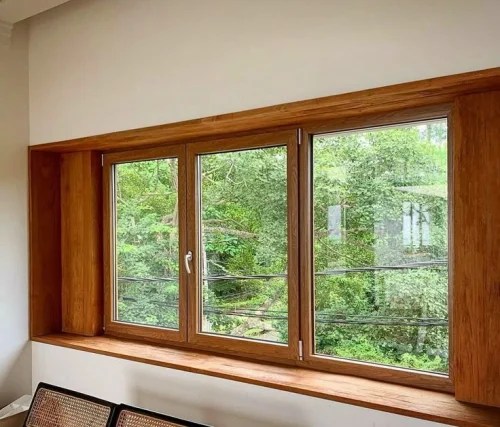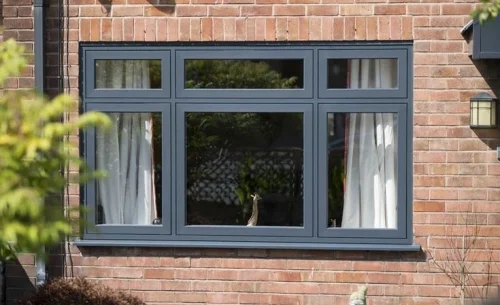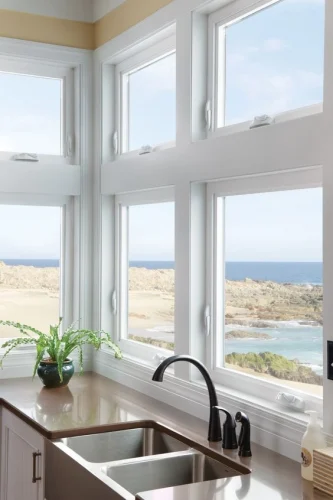
Passive Cooling Design Ideas for Indian Homes: Stay Cool Naturally
June 12, 2025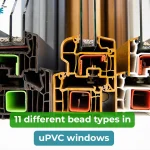
11 Different Types of Beads in uPVC Windows: A Simple Guide Before You Buy
June 12, 2025uPVC windows for coastal areas are a smart investment if you are living near the sea, whether it’s a beach town, a port city, or a humid coastal district. You know how quickly the weather wears things down. Salt air sticks to surfaces, traps moisture, and slowly eats into your home.
Your windows are the first to take the hit. The issue is not just salt and moisture, it’s also humidity, wind and harsh sunlight. No matter how careful you are, coastal weather finds a way to sneak in.
And that’s why experts recommend using uPVC windows for coastal areas. Let’s find out why.
Also read: Top 5 benefits of fitting uPVC windows with inbuilt exhaust fans.
Why uPVC Windows for Coastal Areas Work the Best?
Let’s see why uPVC windows are the best windows for seaside homes. Listing its benefits below.
Corrosion Resistant
Salt air easily rusts the metal. But uPVC ( Unplasticised Polyvinyl Chloride) is a corrosion-free window materials. It’s a special type of plastic that doesn’t react with salt. It does not corrode and form bubbles or flakes. So, your windows won’t look patchy or damaged even after years of facing coastal air.
Humidity proof
In coastal areas, even when it is not raining, the air feels damp. The constant moisture can make the windows swell, crack, or attract fungus. But uPVC doesn’t absorb moisture at all. It stays the same size and shape, no matter how humid the air gets.
Weather Resistant
Coastal weather can be unpredictable. One minute, it can be scorching hot; the next minute, it’s pouring cats and dogs. There’s sand in the wind, salt in the air, and constant exposure to heat and rain. But uPVC is made to handle all of this. It doesn’t fade in the sun, soften in the heat, or crack in heavy rain.
No Water Seepage
There are chances for water to leak through window gaps during the monsoon. With a uPVC window, there’s no need to worry. It comes with airtight sealing and built-in water drainage systems. So, when it rains, the water slides away through hidden channels instead of entering your home.
Low Maintenance
The coastal weather causes salt deposits and dust buildup on surfaces. It demands constant cleaning. But with uPVC, there’s no need for frequent repainting, touch-ups or polishing. Just wipe them with a cloth, and that’s more than enough. Once in a while, wash with mild soap, and they will look as good as new.
Long-Lasting Durability
uPVC windows for coastal areas are the best because they can easily last 20 to 25 years or more, if installed properly. There’s no breakage, rusting, swelling, rattling, cracking or joint failures. This means you can save money on constant repairs or replacements.
Heat & Thermal Insulation
Coastal areas tend to heat up faster, especially in the afternoons. uPVC windows reduce the outside heat that enters your room up to some extent. They slow down heat transfer and keep your home cooler. You can combine it with heat-reflective or double-glazed glass for best results.
Sound Insulation
Constant sound of waves crashing, and noise of fishing boats, fishermen, neighbours, temple speakers and tourist traffic, can really be annoying. By using uPVC windows, you can block these external sounds, too. The thick, sealed frames with proper glass cut down outside noise.
Also read: How realistic are wooden coloured uPVC windows?
UV Resistant
Many window materials fade, peel or crack over time under constant exposure to the sun. But uPVC is made to resist UV rays, and look good for years, without turning yellow or brittle.
Energy Efficient
If your home is better insulated, it is more energy-efficient, as you will rely less on AC or coolers. Since uPVC windows help maintain a stable indoor temperature, you use less electricity, especially in summer.
Safe & Secure
Unlike any other window material, uPVC windows are fitted with multi-point locking systems and strong, tamper-resistant hardware. This adds an extra layer of protection for your house.
Customisable
With uPVC windows comes the scope for customisation. You don’t need to stick to one shape or size. uPVC windows come in many styles, sliding, casement, tilt-and-turn, fixed panels, and more. You can also choose different colours or wood-grain finishes that look aesthetic and versatile.
Environment Friendly
uPVC is eco-friendly and can be recycled. It has a longer lifespan than most of the window materials. Unlike wood, you are not cutting trees to make it. Unlike metal, you are not dealing with mining or frequent replacement. It is a sustainable product.
So, are uPVC windows the best choice for coastal areas? Yes, uPVC windows for coastal areas are the best choice because they are not affected by salt, don’t absorb moisture, and stay stable through years of sun, rain, and humidity. They save you time, money and constant frustration. |
Want To Buy uPVC Windows, But Don’t Know Where? Check Out GreenFortune!
At GreenFortune, we understand what coastal homes go through. That’s why our uPVC windows are corrosion-free, salt air resistant windows, easy to maintain, long-lasting, energy-efficient, can block noise and heat, and are eco-friendly.
They can be customised as per your needs as well. Contact us for more details!
(or) Explore our uPVC windows for coastal areas!
If you are wondering why the other most-used window materials like aluminium, steel, wooden or glass windows are not suitable for coastal areas, here is the reason.
The Problem With Aluminium, Wooden, Steel and Glass Window Frame Materials
Aluminium, wooden, steel and glass window frames get damaged often in coastal areas and require constant repairs, replacements, and upkeep.
Disadvantages of Wooden/Aluminium/Steel/Glass Window Frames In Coastal Areas:
- Wooden window frames- They absorb moisture, swell, and start to jam or crack.
- Aluminium or steel window frames- They corrode faster because salt air speeds up rust.
- Glass panels- They fog, leak or develop cracks around weak joints.
Also read: Why uPVC windows are better than aluminium windows?
Final Takeaway
uPVC windows for coastal areas are the best long-term investment if you live near the sea. They are practical, easy to maintain, and long-lasting. They hold up against salt, sun, rain, and humidity without demanding constant care.
If your current windows are giving you trouble, maybe it’s time for a worthy upgrade- uPVC windows!
FAQs
1) Do uPVC windows need painting or polishing?
No. uPVC windows don’t need painting, polishing, or varnishing. Just wipe them down with a cloth or mild soap and water once in a while.
2) Do uPVC windows come with insect mesh or grills?
Yes, many uPVC windows can include inbuilt mosquito mesh or safety grills. These are optional customisations based on your needs and location.
3) What glass is best for uPVC windows in coastal homes?
Double-glazed, laminated, and heat-reflective glasses are suitable for uPVC windows in coastal areas. They improve insulation, reduce noise, and withstand salty, humid air.







